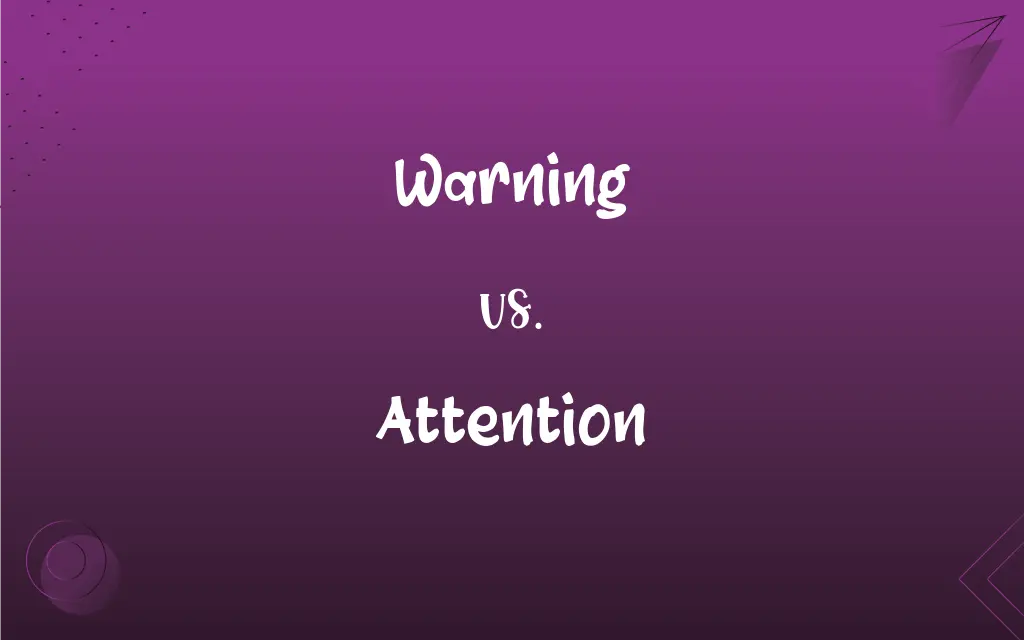Warning vs. Attention: What's the Difference?
Edited by Aimie Carlson || By Janet White || Updated on September 28, 2023
A warning is a notice of potential danger or other undesirable future event, while attention is the act of concentrating or focusing one's mind on something.

Key Differences
The term “warning” denotes an alert or notification intended to make one aware of potential harm, danger, or an undesirable event, signaling the need to take precautionary measures. It implies the provision of critical information, acting as a safeguard by forewarning individuals, allowing them to avoid harmful consequences. On the other hand, “attention” is about the concentration or mental focus directed towards a particular object, person, or task. It’s a cognitive process emphasizing the allocation of mental resources to understand, perceive, or interact with the focused subject.
Warning and attention are interconnected in the way that a warning seeks to capture an individual's attention to relay essential information. A warning is deliberate and explicit, purveying urgency and the need for action or understanding, it communicates risk and highlights the importance of responsiveness. Conversely, attention is a broader cognitive function, encompassing the selective focus on specific information, stimuli, or tasks amid the myriad of sensory inputs. It is the mechanism that allows individuals to process warnings, among other things, effectively.
In essence, a warning is an informational alert, typically urgent, aiming to prevent harm or undesirable outcomes. It’s a cautionary signal providing insights into prospective risks and enabling individuals to make informed decisions. Attention, alternatively, is the cognitive process whereby an individual selectively concentrates on one aspect of their environment while ignoring others. It’s the mental spotlight highlighting specific information or stimuli, allowing for detailed perception and understanding, thereby facilitating the acknowledgment and comprehension of warnings.
Delineating the functional aspects, warning serves as a protective and preventive tool, relaying specific information about impending dangers or undesired circumstances, and urging corrective or preventive actions. Its effectiveness is contingent on the ability to command attention and convey urgency. In contrast, attention operates as the cognitive gateway, determining what information is processed, and it's the enabler that allows for discernment, understanding, and response to the varied inputs, including warnings.
When evaluating their roles, warning is the messenger conveying cautionary information about potential threats or unfavorable situations, aiming to invoke attentiveness and responsive action. It acts as the precursor, necessitating attention for effective communication and understanding. In contrast, attention is the receptive and processing entity, the focal point determining the depth of interaction, understanding, and response to the surrounding environment, including the reception of warnings.
ADVERTISEMENT
Comparison Chart
Definition
A notice of potential danger or undesirable event.
The act of focusing one's mind on something.
Nature
Informative and cautionary.
Cognitive and selective.
Purpose
To alert and prevent harm or undesirable outcomes.
To process information or stimuli selectively.
Scope
Specific and often urgent.
Broad and variable, dependent on interest and stimuli.
Outcome
Awareness and preventative action.
Perception, understanding, and response to stimuli.
ADVERTISEMENT
Warning and Attention Definitions
Warning
A statement or event that indicates a possible or impending danger, problem, or other unpleasant situation.
He ignored the warning about the impending storm and went sailing.
Attention
The mental faculty of considering or taking notice of someone or something.
The noise outside drew her attention away from the book.
Warning
An advance notice of something that could cause harm in the future.
The label on the bottle had a warning about the harmful effects if ingested.
Attention
Consideration with a view to action.
The fragile shipment needs careful attention while handling.
Warning
An admonition to be cautious.
The officer gave her a warning for speeding instead of a ticket.
Attention
The act or state of applying the mind to something.
The project requires your full attention.
Warning
A cautionary advice or notice.
The doctor gave a warning about the side effects of the medication.
Attention
The act of close or careful observing or listening
You'll learn more if you pay attention in class.
Warning
A statement telling of or an indication providing evidence of impending danger, difficulty, or misfortune
The government issued a warning about unsafe drinking water. The shelf collapsed without any warning.
Attention
The ability or power to keep the mind on something; the ability to concentrate
We turned our attention to the poem's last stanza.
Warning
Advice to be cautious
A word of warning to runners about the hot weather.
Attention
Notice or observation
The billboard caught our attention.
Warning
A cautionary or deterrent example
The incident is a warning to careless investors.
Attention
The act of dealing with something or someone; treatment
This injury requires immediate medical attention.
Warning
Acting or serving to warn
A warning light.
Warning words.
Attention
Acts of interest or interference
"men who wanted ... freedom from censorship and the attentions of the police" (John Kenneth Galbraith).
Warning
Present participle of warn
Attention
Acts of consideration or courtesy, especially in an effort to win someone's affection or gain sexual favors
"She was almost giddy with disbelief at the unexpected attentions of a handsome, well-spoken, obviously professional man" (Rob Kantner).
Warning
The action of the verb warn; an instance of warning someone.
Attention
A military posture, with the body erect, eyes to the front, arms at the sides, and heels together.
Warning
Something spoken or written that is intended to warn.
The boss gave him a warning that he would be fired if he did not desist from his behaviour.
Attention
Used as a command to assume an erect military posture.
Warning
Used to warn of danger in signs and notices.
Attention
(uncountable) Mental focus.
Please direct your attention to the following words.
Warning
Giving previous notice; cautioning; admonishing; as, a warning voice.
That warning timepiece never ceased.
Attention
(countable) An action or remark expressing concern for or interest in someone or something, especially romantic interest.
Warning
Previous notice.
A great journey to take upon so short a warning.
Attention
A state of alertness in the standing position.
The company will now come to attention.
Warning
Caution against danger, or against faults or evil practices which incur danger; admonition; monition.
Could warning make the world more just or wise.
Attention
A technique in neural networks that mimics cognitive attention, enhancing the important parts of the input data while giving less priority to the rest.
Warning
A message informing of danger
Attention
(military) Used as a command to bring soldiers to the attention position.
Warning
Cautionary advice about something imminent (especially imminent danger)
Attention
A call for people to be quiet/stop doing what they are presently doing and pay heed to what they are to be told or shown.
Warning
Serving to warn;
Shook a monitory finger at him
An exemplary jail sentence
Attention
The act or state of attending or heeding; the application of the mind to any object of sense, representation, or thought; notice; exclusive or special consideration; earnest consideration, thought, or regard; obedient or affectionate heed; the supposed power or faculty of attending.
They say the tongues of dying menEnforce attention like deep harmony.
Warning
A signal or alarm to alert people.
The weather service issued a hurricane warning for the coast.
Attention
An act of civility or courtesy; care for the comfort and pleasure of others; as, attentions paid to a stranger.
Attention
The process whereby a person concentrates on some features of the environment to the (relative) exclusion of others
Attention
The work of caring for or attending to someone or something;
No medical care was required
The old car needed constant attention
Attention
A general interest that leads people to want to know more;
She was the center of attention
Attention
A courteous act indicating affection;
She tried to win his heart with her many attentions
Attention
The faculty or power of mental concentration;
Keeping track of all the details requires your complete attention
Attention
A motionless erect stance with arms at the sides and feet together; assumed by military personnel during drill or review;
The troops stood at attention
Attention
A notice or regard in the mind.
The new policy is designed to get the attention of the public.
Attention
A sympathetic consideration of the needs and wants of someone.
The teacher pays extra attention to students who are struggling.
FAQs
Is attention always voluntary?
No, attention can be both voluntary and involuntary, depending on the stimuli.
Can a warning be implied?
Yes, warnings can be explicit or implied through context or circumstances.
Is a warning always negative?
Generally yes, warnings typically alert to potential dangers or negative outcomes.
Are warnings legally binding?
Some are, especially in contexts like safety regulations and product labels, and ignoring them may have legal implications.
Can attention be improved?
Yes, attention can be improved through practice, mindfulness, and cognitive training.
Is a warning meant to induce fear?
Not necessarily, it's primarily meant to inform and prevent harm, though it may induce fear.
Can attention be divided?
Yes, people can divide their attention, but this usually leads to reduced effectiveness.
Can warnings be verbal or written?
Yes, warnings can be conveyed both verbally and in writing.
Can a warning be casual?
Yes, a warning can be informal or casual, depending on the context.
Can we control what we pay attention to?
To some extent, but involuntary attention can be drawn by unexpected or salient stimuli.
Is attention a finite resource?
Yes, attention is limited and can be exhausted with overuse.
Are all warnings accurate?
No, some warnings may be based on potential risks and may not always materialize.
Is sustained attention challenging?
Yes, maintaining attention over long periods can be difficult, especially without interest.
Can attention be selective?
Yes, selective attention allows individuals to focus on specific stimuli while ignoring others.
Can warnings be visual or auditory?
Yes, warnings can be conveyed through visual signs, sounds, or a combination of both.
About Author
Written by
Janet WhiteJanet White has been an esteemed writer and blogger for Difference Wiki. Holding a Master's degree in Science and Medical Journalism from the prestigious Boston University, she has consistently demonstrated her expertise and passion for her field. When she's not immersed in her work, Janet relishes her time exercising, delving into a good book, and cherishing moments with friends and family.
Edited by
Aimie CarlsonAimie Carlson, holding a master's degree in English literature, is a fervent English language enthusiast. She lends her writing talents to Difference Wiki, a prominent website that specializes in comparisons, offering readers insightful analyses that both captivate and inform.































































